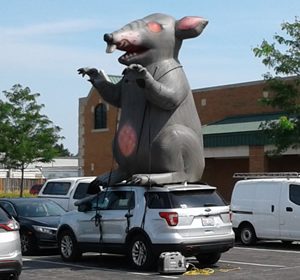“Scabby” the inflatable rat has always seemed more impactful than a group of grizzled, union rank & file picketing a construction site where non-union peers are executing contracts at more competitive rates. Unions dispatch the rentable balloons—portable, inflatable in minutes or less, and commanding a footprint no larger than a pickup truck or SUV—as an effective means of expressing grievances against merit shop contractors.
As difficult as they find it to be honest with members and the general public, union locals who make a statement with a rat balloon can’t be accused of lacking a sense of humor. Nor can a panel from the U.S. Court of Appeals for Seventh Circuit, Chicago. It recently determined that enforcement of a Grand Chute, Wis., sign ordinance prompting removal of a 12-ft. Scabby—staged on public right-of-way and targeting a masonry contractor performing work at auto dealership—did not violate the First Amendment rights of Construction and General Laborers’ Union Local 330, Menasha, Wis.
The union deployed Scabby in April 2014 on a frontage road across from Kolosso Toyota, but after three days was informed by the Grande Chute code enforcement officer that use of the rat balloon would have to cease per the town’s sign ordinance. Laborers’ Local 330 sued in U.S. District Court, contending the ordinance violated the First Amendment because it distinguished among signs on the basis of content. The District Court ruled in Grand Chute’s favor, concluding that the ordinance was content-neutral, applied in an even-handed manner, and left the union with alternate means to convey its message. Local 330 petitioned the Seventh Circuit for review, primarily in hopes of recovering damages rooted in paying members to assist in Kolosso Toyota picketing and expending organizing staff resources.
“This ruling creates a glimmer of hope for employers in what has otherwise been a frustrating and ineffective battle to curb an annoying union tactic. Scabby has survived employer attempts to eradicate union inflatables on the grounds that the rodent constitutes unlawful picketing, an unlawful secondary boycott, or violates local zoning laws,” writes Michelle Devlin, an associate in the New Haven, Conn., office of leading labor relations counsel Littler Mendelson PC. “The National Labor Relations Act prohibits conduct found to ‘threaten, coerce, or restrain’ a secondary employer not directly involved in a primary labor dispute, if the object of that conduct is to cause the secondary to cease doing business with the primary employer. The National Labor Relations Board and federal courts have long issued rulings holding that inflatables like Scabby fall on the noncoercive side of the spectrum, along with stationary handbilling, and/or are symbolic speech protected by the First Amendment.”
To its credit, Grand Chute has proved that limits to the First Amendment don’t stop at prohibiting individuals from yelling “fire” in a crowded theater.
